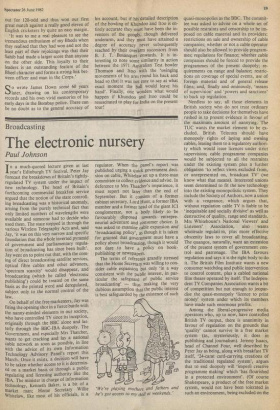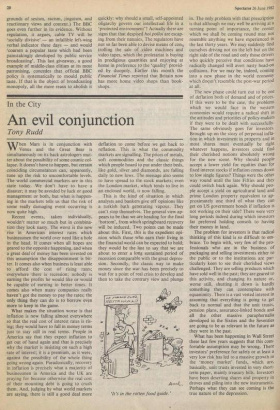Broadcasting
The electronic nursery
Paul Johnson
In a much-quoted lecture given at last year's Edinburgh TV festival, Peter Jay forecast the breakdown of Britain's tightly- regulated TV system under the impact of new technology. The head of Britain's forthcoming commercial breakfast service argued that the notion of the state controll- ing broadcasting was a historical anomaly, arising from the purely technical fact that only limited numbers of wavelengths were available and someone had to decide who used them. The state stepped in through the various Wireless Telegraphy Acts and, said Jay, 'it was on this very narrow and specific foundation that the whole inverted pyramid of government and parliamentary regula- tion of broadcasting has since been built'. Jay went on to point out that, with the com- ing of direct broadcasting satellite services, optical fibre cables and other advances, 'spectrum scarcity' would disappear, and broadcasting (which he called 'electronic publishing') could be treated on the same basis as the printed word and deregulated, subject only to the normal control of the law.
On behalf of the free marketeers, Jay was firing the opening shot in a fierce battle with the nanny-minded elements in our society, who have controlled TV since its inception, originally through the BBC alone and lat- terly through the BBC-IBA duopoly. The Government, and especially Mrs Thatcher, wants to get cracking and lay a national cable network as soon as possible, in line With the advice of its own Information Technology Advisory Panel's report this March. Once it exists, a decision will have to be taken whether access to it is determin- ed on a market basis or through a public regulating and licensing authority like the IBA. The minister in charge of information technology, Kenneth Baker, is a bit of a market man; Home Secretary Willie Whitelaw, like most of his officials, is a
regulator. When the panel's report was published urging a quick government deci- sion on cable, Whitelaw set up a three-man committee to collect evidence and advise. In deference to Mrs Thatcher's impatience, it must report not later than the end of September. But it consists of a former cabinet secretary, Lord Hunt, a former IBA member and a former head of the giant ICI conglomerate, not a body likely to be favourably disposed towards entrepre- neurial adventure and consumer choice. It was asked to examine cable expansion and 'broadcasting policy', as though it is taken for granted that government must have a policy about broadcasting, though it would not dare to have a policy on book- publishing or newspapers.
The terms of reference grandly stressed that the Home Secretary was willing to con- sider cable expansion but only 'in a way consistent with the public interest, in par- ticular the safeguard of public service broadcasting' — thus making the very dubious assumption that the public interest is best safeguarded by the existence of such 'We're playing mothers and fathers and he's got access tomy doll at weekends.'
quasi-monopolies as the BBC. The commit- tee was asked to advise on a whole set of possible restraints and censorship to be im- posed on cable material and its providers: restrictions on sale and ownership of cable companies; whether or not a cable operator should also be allowed to provide program- mes; regulations for finance; whether cable companies should be forced to provide the programmes of the present duopoly; re- quirements on range and balance; restric- tions on coverage of special events, use of foreign material and of general release films; and, finally and ominously, 'means of supervision' and 'powers and sanctions' to back up regulation.
Needless to say, all those elements in British society who do not trust ordinary people to take decisions for themselves have rushed in to present evidence in favour of the maximum amount of nannying. The TUC wants the market element to be ex- cluded. British Telecom should have monopoly rights of laying and owning cables, leasing them to a regulatory authori- ty which would issue licences under strict supervision; cable programme companies would be subjected to all the restraints under the existing system plus a further obligation `to reflect views excluded from, or unrepresented on, broadcast TV' (we know what that means). Interested unions seem determined to fit the new technology into the existing monopolistic system. They include the Society of Authors, now a union with a vengeance, which argues that, without regulation cable TV is liable to be inequitable and socially divisive' as well as destructive of quality, range and standards. Mrs Whitehouse's National Viewers' and Listeners' Association, also wants wholesale regulati 3n, plus more effective obscenity laws to cover all broadcasting. The quangos, naturally, want an extension of the present system of government con- trol and patronage. The IBA favours regulation and says it is the right body to do it. The British Film Institute wants a new consumer watchdog and public intervention to control content, plus a cabled national film theare operated by itself. The Indepen- dent TV Companies Association wants a bit of competition but not enough to jeopar- dise the quasi-monopoly 'licence to print money' system under which its members have made such enormous profits.
Among the liberal-progressive media operators who, up to now, have controlled British TV output, there is unanimity in favour of regulation on the grounds that 'quality' cannot survive in a free market system (as, mysteriously, it does in publishing and journalism). Jeremy Isaacs, head of Channel Four, well described by Peter Jay as being, along with breakfast TV itself, '24-carat card-carrying creations of the traditional regulated system', argues that to end duopoly will 'imperil creative programme making' which 'has flourished in a protected environment'. (Of course Shakespeare, a product of the free market system, would not have been tolerated in such an environment, being excluded on the grounds of sexism, racism, jingoism, and reactionary views and content.) The BBC goes even further in its evidence. Without regulation, it argues, cable TV will be 'socially divisive' — an infallible left-wing verbal indicator these days — and would 'coarsen a popular taste which had been painstakingly developed by public service broadcasting'. This last giveaway, a good example of middle-class elitism at its most patronising, concedes that official BBC policy is systematically to mould public taste. If that is the object of broadcasting monopoly, all the more reasn to abolish it quickly: why should a small, self-appointed oligarchy govern our intellectual life in a 'protected environment'? Actually there are signs that that despised hoi polloi are escap- ing from their nannies. The regulators have not so far been able to devise means of con-. trolling the sale of video machines and video tapes, which the proletariat is buying in prodigious quantities and enjoying at home in preference to the 'quality' provid- ed by duopoly. Earlier this month the Financial Times reported that Britain now has more home video shops than book- shops.























































 Previous page
Previous page